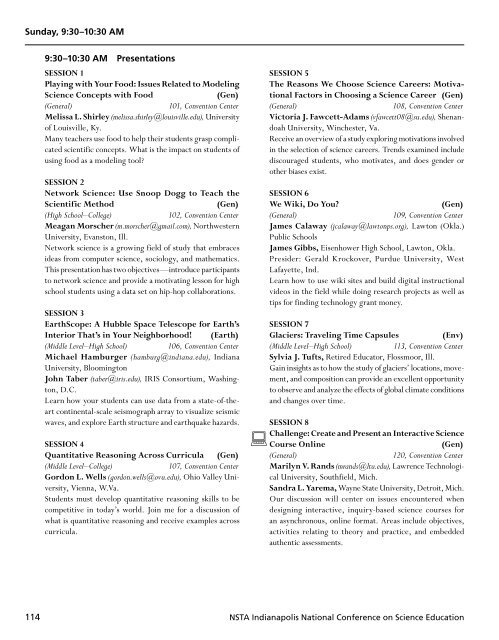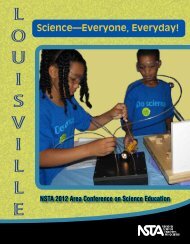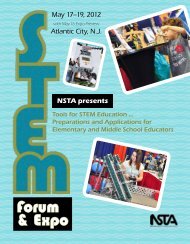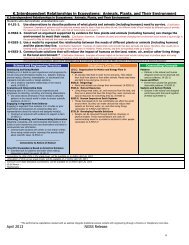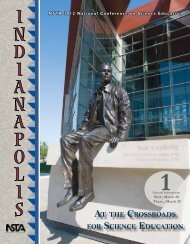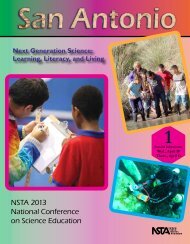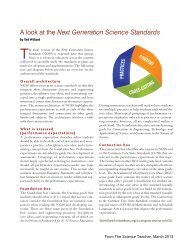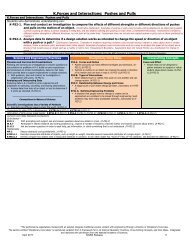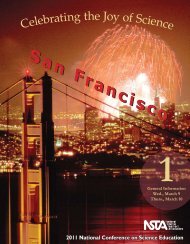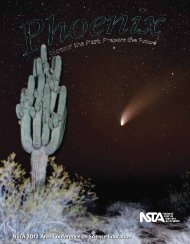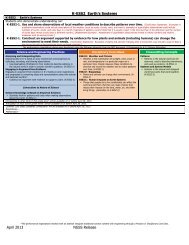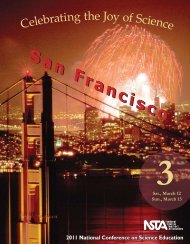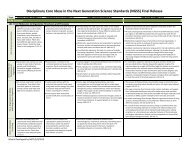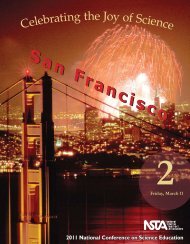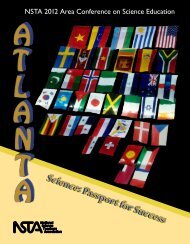Saturday/Sunday
Saturday/Sunday
Saturday/Sunday
You also want an ePaper? Increase the reach of your titles
YUMPU automatically turns print PDFs into web optimized ePapers that Google loves.
<strong>Sunday</strong>, 9:30–10:30 AM<br />
9:30–10:30 AM Presentations<br />
SESSION 1<br />
Playing with Your Food: Issues Related to Modeling<br />
Science Concepts with Food<br />
(Gen)<br />
(General)<br />
101, Convention Center<br />
Melissa L. Shirley (melissa.shirley@louisville.edu), University<br />
of Louisville, Ky.<br />
Many teachers use food to help their students grasp complicated<br />
scientific concepts. What is the impact on students of<br />
using food as a modeling tool<br />
SESSION 2<br />
Network Science: Use Snoop Dogg to Teach the<br />
Scientific Method<br />
(Gen)<br />
(High School–College)<br />
102, Convention Center<br />
Meagan Morscher (m.morscher@gmail.com), Northwestern<br />
University, Evanston, Ill.<br />
Network science is a growing field of study that embraces<br />
ideas from computer science, sociology, and mathematics.<br />
This presentation has two objectives—introduce participants<br />
to network science and provide a motivating lesson for high<br />
school students using a data set on hip-hop collaborations.<br />
SESSION 3<br />
EarthScope: A Hubble Space Telescope for Earth’s<br />
Interior That’s in Your Neighborhood! (Earth)<br />
(Middle Level–High School)<br />
106, Convention Center<br />
Michael Hamburger (hamburg@indiana.edu), Indiana<br />
University, Bloomington<br />
John Taber (taber@iris.edu), IRIS Consortium, Washington,<br />
D.C.<br />
Learn how your students can use data from a state-of-theart<br />
continental-scale seismograph array to visualize seismic<br />
waves, and explore Earth structure and earthquake hazards.<br />
SESSION 4<br />
Quantitative Reasoning Across Curricula (Gen)<br />
(Middle Level–College)<br />
107, Convention Center<br />
Gordon L. Wells (gordon.wells@ovu.edu), Ohio Valley University,<br />
Vienna, W.Va.<br />
Students must develop quantitative reasoning skills to be<br />
competitive in today’s world. Join me for a discussion of<br />
what is quantitative reasoning and receive examples across<br />
curricula.<br />
<br />
SESSION 5<br />
The Reasons We Choose Science Careers: Motivational<br />
Factors in Choosing a Science Career (Gen)<br />
(General)<br />
108, Convention Center<br />
Victoria J. Fawcett-Adams (vfawcett08@su.edu), Shenandoah<br />
University, Winchester, Va.<br />
Receive an overview of a study exploring motivations involved<br />
in the selection of science careers. Trends examined include<br />
discouraged students, who motivates, and does gender or<br />
other biases exist.<br />
SESSION 6<br />
We Wiki, Do You<br />
(Gen)<br />
(General)<br />
109, Convention Center<br />
James Calaway (jcalaway@lawtonps.org), Lawton (Okla.)<br />
Public Schools<br />
James Gibbs, Eisenhower High School, Lawton, Okla.<br />
Presider: Gerald Krockover, Purdue University, West<br />
Lafayette, Ind.<br />
Learn how to use wiki sites and build digital instructional<br />
videos in the field while doing research projects as well as<br />
tips for finding technology grant money.<br />
SESSION 7<br />
Glaciers: Traveling Time Capsules<br />
(Env)<br />
(Middle Level–High School)<br />
113, Convention Center<br />
Sylvia J. Tufts, Retired Educator, Flossmoor, Ill.<br />
Gain insights as to how the study of glaciers’ locations, movement,<br />
and composition can provide an excellent opportunity<br />
to observe and analyze the effects of global climate conditions<br />
and changes over time.<br />
SESSION 8<br />
Challenge: Create and Present an Interactive Science<br />
Course Online<br />
(Gen)<br />
(General)<br />
120, Convention Center<br />
Marilyn V. Rands (mrands@ltu.edu), Lawrence Technological<br />
University, Southfield, Mich.<br />
Sandra L. Yarema, Wayne State University, Detroit, Mich.<br />
Our discussion will center on issues encountered when<br />
designing interactive, inquiry-based science courses for<br />
an asynchronous, online format. Areas include objectives,<br />
activities relating to theory and practice, and embedded<br />
authentic assessments.<br />
114 NSTA Indianapolis National Conference on Science Education


